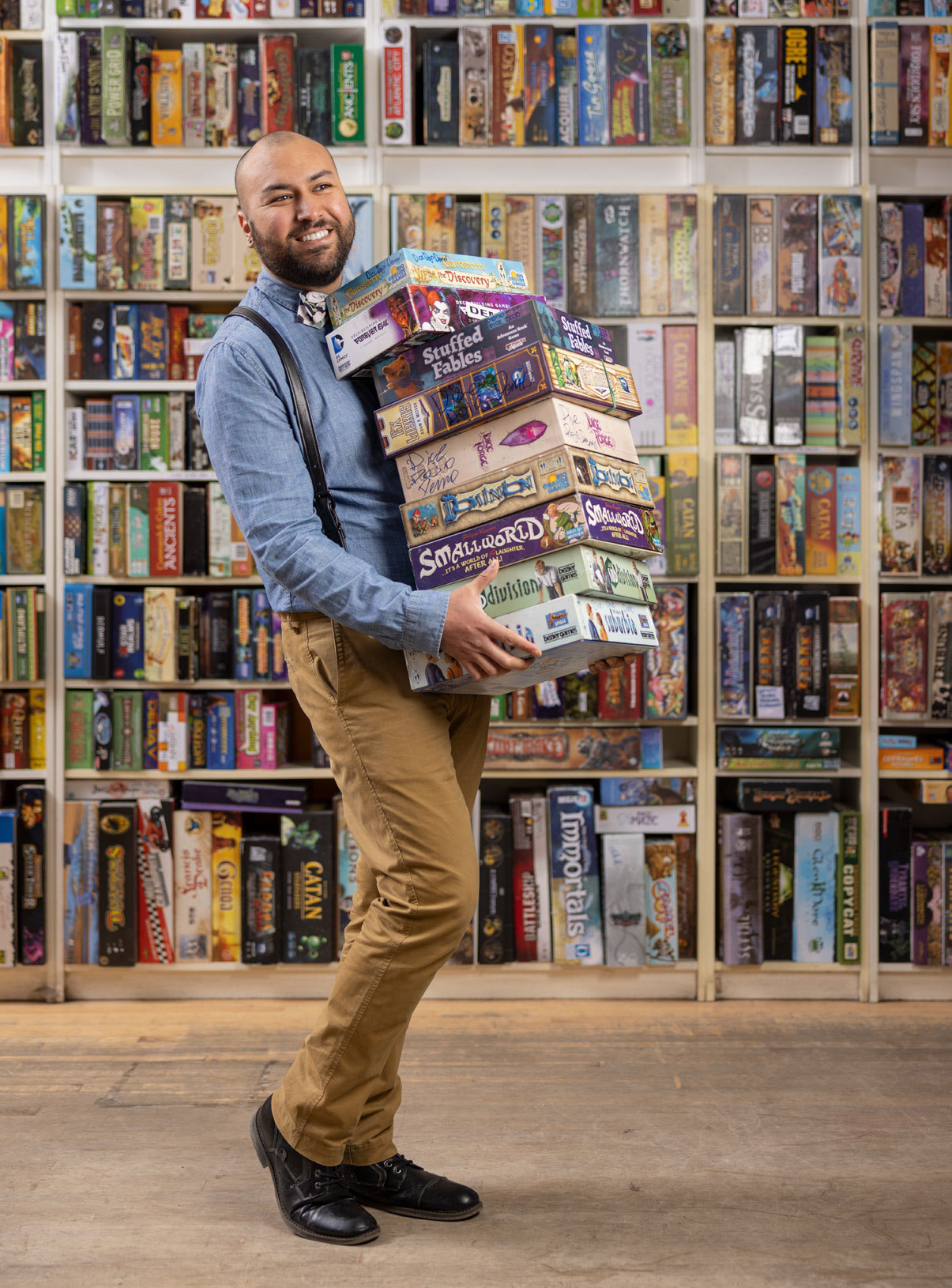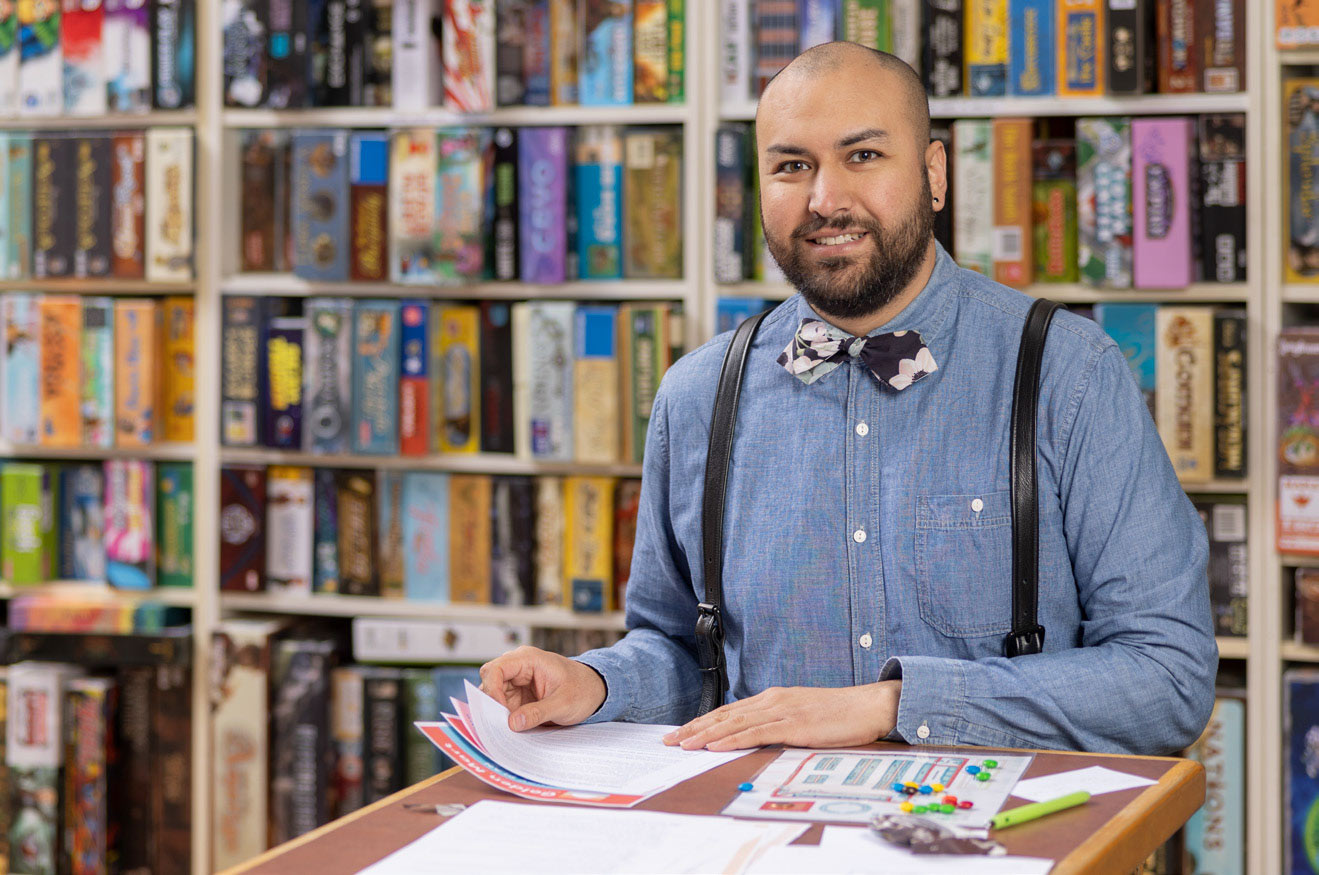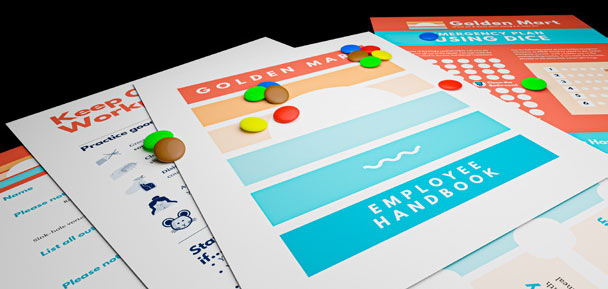

Michael Anthony DeAnda (Ph.D. Technology and Humanities ’19) designs games with the aim of showing the game industry, and society at large, new ways of being.
“I want to create spaces of care where we can shape compassion between people,” says DeAnda, a professional lecturer at DePaul University. “I want a game where I can just be, exist, and develop these moments of expressing humanity between people.”
As both a game designer and game scholar, DeAnda centers much of his work on the experiences, needs, and histories of marginalized communities, with a particular focus on the lesbian, gay, bisexual, transgender, and queer or questioning (LGBTQ) community.
When the COVID-19 pandemic began, DeAnda heard his community’s struggles.
“A lot of folks in the LGBTQ community were worried about the loss of community identity at large, and with gay bars shutting down comes a loss of spaces that we have associated as our own where we can unmask and be in the presence of kin,” says DeAnda. “Especially for people who weren’t out, lockdown created a lot of anxiety for them, putting some in potentially harmful situations.”
Out of this need came Golden Mart, a single-player tabletop role-playing game in which players take the role of a convenience store worker aiming to maintain the golden standard of excellence in their job, despite the recent onset of a magical apocalypse. Over the course of a night shift, players serve customers and handle tasks in the store until either their shift ends or a catastrophe destroys the store.

“The thinking behind Golden Mart was to provide players with a space to explore and grieve and sit with this anxiety through narrative storytelling,” says DeAnda.
Funded by an exceptionally successful Kickstarter campaign, DeAnda and Golden Mart co-creator Carly Kocurek, an associate professor of digital humanities and media studies at Illinois Tech, are currently expanding the game and preparing it for wider distribution.
DeAnda is a founding member of the emergent area of queer theory in games, and some of his games create spaces for people to explore gender and sexuality directly.
In a tabletop game formerly known as TRANS-gression, players take on drag queen personas. As part of the path to victory, players don accessories such as jewelry, gloves, and a feather boa. DeAnda is currently iterating the game, which he designed in 2013, and retitling it to not conflate transgender and drag.
“I created this game to allow players to explore gender identities that do not subscribe to heteronormative confines,” says DeAnda. “My vision for this game was to provide genderqueer individuals with a vehicle to discuss their gender identities with people who are close to them in a way that would challenge these people to develop a more fluid conception of gender.”
“He’s frickin’ amazing at creating these queer spaces that open up non-normative ways of understanding the world. And play is always non-normative, so we’re going to start turning more and more to queer theory to define the everyday discourse of how we attend to games,” says Jennifer deWinter, professor of rhetoric at Worcester Polytechnic Institute.
Through his work designing games, DeAnda says he has felt empowered to express his voice and explore his identities; he says the process has been cathartic. As an instructor, he aims to give students opportunities to do the same.
“[Teaching game design] gives me a way to engage students who might feel like they don’t have a voice or that their voice isn’t valued,” says DeAnda. “I’m inviting people with underrepresented voices to design and express their own lived experiences, their own cultures, their own ways of knowledge formation through games.”
“Michael has been an amazing community leader and supporter in game studies,” says Wendi Sierra, associate professor of game studies at Texas Christian University. “He is amazingly compassionate, but with wit and sardonic charm to balance that compassion with a bit of bite when needed.”
DeAnda teaches his students that games can act as a microcosm of the real world, and when infused with a deliberate perspective, they can become a forum for exploring real change.
“We come to play games and develop this algorithmic logic. We then leave the game space and start thinking through our day-to-day realities through similar algorithms,” says DeAnda. “So in thinking about game design, I like to ask, ‘What are ways to intervene in this process or to design systems that are more queer or attended to people and communities on the margins?’”
But it’s all about balance.
DeAnda says that when taking on topics like isolation, sexuality, or gender expression that people may find difficult to discuss, he takes particular care to keep his games playful and inviting.
“I see a lot of trying to beat people over the head with a message, and oftentimes what happens is that players who are open to the message understand and realize it, and then players who aren’t [open to it] put the game down and walk away,” he says. “My approach is thinking through how I can invite the player into these spaces and allow them to be transformed through the play experience.”
The Night Shift at Golden Mart

Golden Mart was designed to use M&Ms—or any tasty snack that comes in a multiple of six—instead of a die, where which color you draw from the bag determines what happens in the game.
DeAnda says, “By turning toward unexpected design tools, I’m interested in arguing for expanding our understanding of what games are. At a more activist level, my thinking is that if we can revisit the logic that we privilege in these items through play, this might be a way to revisit the logic that governs the larger ways that we create worlds, shape communities, and engage in political activism. It’s thinking about how we train our thinking, and then how we materialize that into the world.”
- Apply for the Job: Let Golden Mart know what skills you bring to the table as an employee, such as your customer service skills or general know-how. If you happen to be a telepath, include that, too! This will serve as your character sheet throughout the game.
- Determine the Catastrophe: Draw M&Ms to determine if you’re about to face a zombie outbreak, flood of ectoplasmic slime, or some other magical inconvenience to your workday.
- Work Your Shift: Make decisions and draw M&Ms to determine how your tasks go, including interactions with customers, restocking inventory, and cleaning the bathrooms. A random M&M draw will also determine how the catastrophe progresses.
- End of Shift: If the catastrophe destroys the store, it’s game over, but hopefully you’ll make it to the end of your shift alive!
- Incident Report: Before clocking out, record what happened during your shift. It will give you a chance to reflect on the experience, and the day shift will thank you.